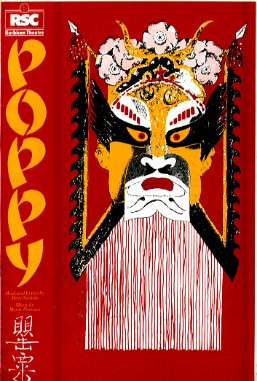Poppy (1982 musical) facts for kids
Quick facts for kids Poppy |
|
|---|---|

Original Recording
|
|
| Music | Monty Norman |
| Lyrics | Peter Nichols |
| Book | Peter Nichols |
| Basis | The First Opium War |
| Productions | 1982 Royal Shakespeare Company 1983 West End |
| Awards | Olivier Award for Best New Musical |
Poppy is a musical comedy play from 1982. It tells a story set during the First Opium War in the 1840s. The play is like a traditional British pantomime. This means it has funny characters, songs, and audience participation. It includes a hero called Dick Whittington, a pantomime dame (a man dressed as a funny woman), and even two pantomime horses. Peter Nichols wrote the story and songs, and Monty Norman wrote the music. Even though the play has some serious parts, it mostly shows the British characters having a happy ending.
Contents
The Story of Poppy
The play begins in 1840. The Emperor of China sends a message to the young Queen Victoria. He warns her about trade practices. The first scene is in a cute, old-fashioned English village. This village is the home of Sir Richard (Dick) Whittington and his mother, Lady Dodo.
Dick's Big Adventure
Dick decides to leave his village. He wants to find his fortune in London or in the new factory towns. His loyal helper, Jack Idle, goes with him. Jack is sad to leave his girlfriend, Sally. Their horses, Randy and Cherry, also seem to like each other! Lady Dodo misses the old days. But Dick believes exciting times are still ahead.
Sally is left behind with her horse. She feels confused because she likes Jack but also has feelings for Sir Richard. He is also her legal guardian. Secretly, Sally and Lady Dodo decide to travel to London on their own.
Making Fortunes in China
In London, Dick meets Obadiah Upward. He is a rising merchant. Obadiah explains how they can become rich by trading a plant called "poppy" from distant China. Lady Dodo and Sally arrive, and they all agree to go on this journey.
They sail to India. In the poppy fields, Lady Dodo sings about why she likes Obadiah. Dick and Jack think about British India and the East India Company. They sing a song about the history of British influence there.
The Conflict Begins
The Emperor of China tells Queen Victoria to stop the poppy trade. But she says that the "Bounty of the Earth" should be shared by everyone. The Emperor sends Commissioner Lin to Canton in China. His job is to stop the trade. In Canton, Lin meets Viceroy Teng and his daughter Yoyo. Yoyo is confused by the European visitors.
Obadiah refuses to be scared by Lin's warnings. He sends Dick further along the coast to find new places to trade. Queen Victoria joins Dick's group. She acts as an interpreter and a Christian missionary. She explains that trade is justified by "Civilisation, Commerce and Christianity."
Before they leave, Lady Dodo tells Sally a secret. She says that Dick is not only Sally's guardian but also her half-brother.
The War and Its End
The Chinese forces surround the European trading area. The animals have to be killed for food. Jack sings a sad song to his horse, Randy, before he has to kill him.
A war follows, known as the First Opium War. The Chinese are defeated. They have to give Hong Kong Island to the British. Lady Dodo and Obadiah sing about how British and French soldiers took over the Imperial Summer Palace in Peking.
Musical Songs
|
Act One
|
Act Two
|
Show History
Poppy first opened on September 25, 1982. It was performed by the Royal Shakespeare Company at the Barbican Centre. That year, it won an important award: the Society of West End Theatre Award for best new musical.
The play later moved to the Adelphi Theatre on November 14, 1983. It ran there until February 18, 1984. The show has been performed again several times since then. These include a performance in December 1988 at the Half Moon Theatre. Student groups and other theatre companies have also staged it.
On July 9, 2011, a special "script-in-hand" performance was held. This was part of the Royal Shakespeare Company's 50th Birthday celebrations. Both the writer, Peter Nichols, and the composer, Monty Norman, were there to watch.
 | Kyle Baker |
 | Joseph Yoakum |
 | Laura Wheeler Waring |
 | Henry Ossawa Tanner |

